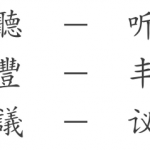Articles tagged with ‘Taiwan’
-
You won’t learn Chinese simply by living abroad
A widespread myth about learning Chinese is that you will master the language simply by moving abroad to live in an immersion environment. However, how much you learn is determined by how much you engage with the language, not by your geographical location.
Read → -
Standard pronunciation in Chinese and why you want it
What should you learn if your friends and your teacher tell you different things? How should you navigate the space between standard pronunciation and regional accents? Standard pronunciation will help you communicate, but a regional accent might help you fit in.
Read → -
What important words are missing from TOCFL?
TOCFL is the standard test of Chinese proficiency in Taiwan. The official lists cover a total of 8000 words spread over 6 levels, but what words are common, yet missing or delayed in these lists? This article strives to answer this question. As a student, you probably want to check the missing and delayed words to plug holes in your Chinese vocabulary!
Read → -
How I learnt Chinese, part 6: Graduate program in Taiwan
I’ve spent two years in a master’s program for teaching Chinese as a second language, designed for native speakers and taught in Chinese. Here’s what I learnt from the experience!
Read → -
How I learnt Chinese, part 4: My second year in Taiwan
This post covers my third year of learning Chinese, which was spent at NTNU in Taipei and at Wenzao in Gaoxiong. I round off with important lessons I learnt about learning Mandarin during this time.
Read → -
How I learnt Chinese, part 3: My first year in Taiwan
My second year of learning Chinese was largely spent in Taiwan, where I learnt a lot, despite not always using the best approach.
Read → -
5 insights from the first year of a master’s program in Taiwan
Pursuing an academic degree taught in Chinese is a great example of instrumental motivation. This article contains five insights from my first year at the Graduate Institute for Teaching Chinese as a Second Language (華語文教學研究所) in Taipei, Taiwan. Among other things, the article is about grammar, native speakers, the importance of having fun and the essence of communicative learning.
Read → -
RTI, my favourite radio station
If you want to improve your listening ability, always having something to listen to is essential. Preferably, it should require effort to NOT listen to Chinese. Only have Chinese audio on your phone, set a radio station on autostart on your computer, etc. This article is about RTI, an excellent source of listening material. It’s good mostly because of its diversity and ease of access, meaning that you will never run out of things to listen to.
Read → -
Learning simplified and traditional Chinese
Learning traditional characters if you know simplified or vice versa is a lot easier than beginners tend to think. Generally, you don’t need to worry, because at an advanced level, learning both is quite easy. This article is about simplified/traditional and how to learn both.
Read →







